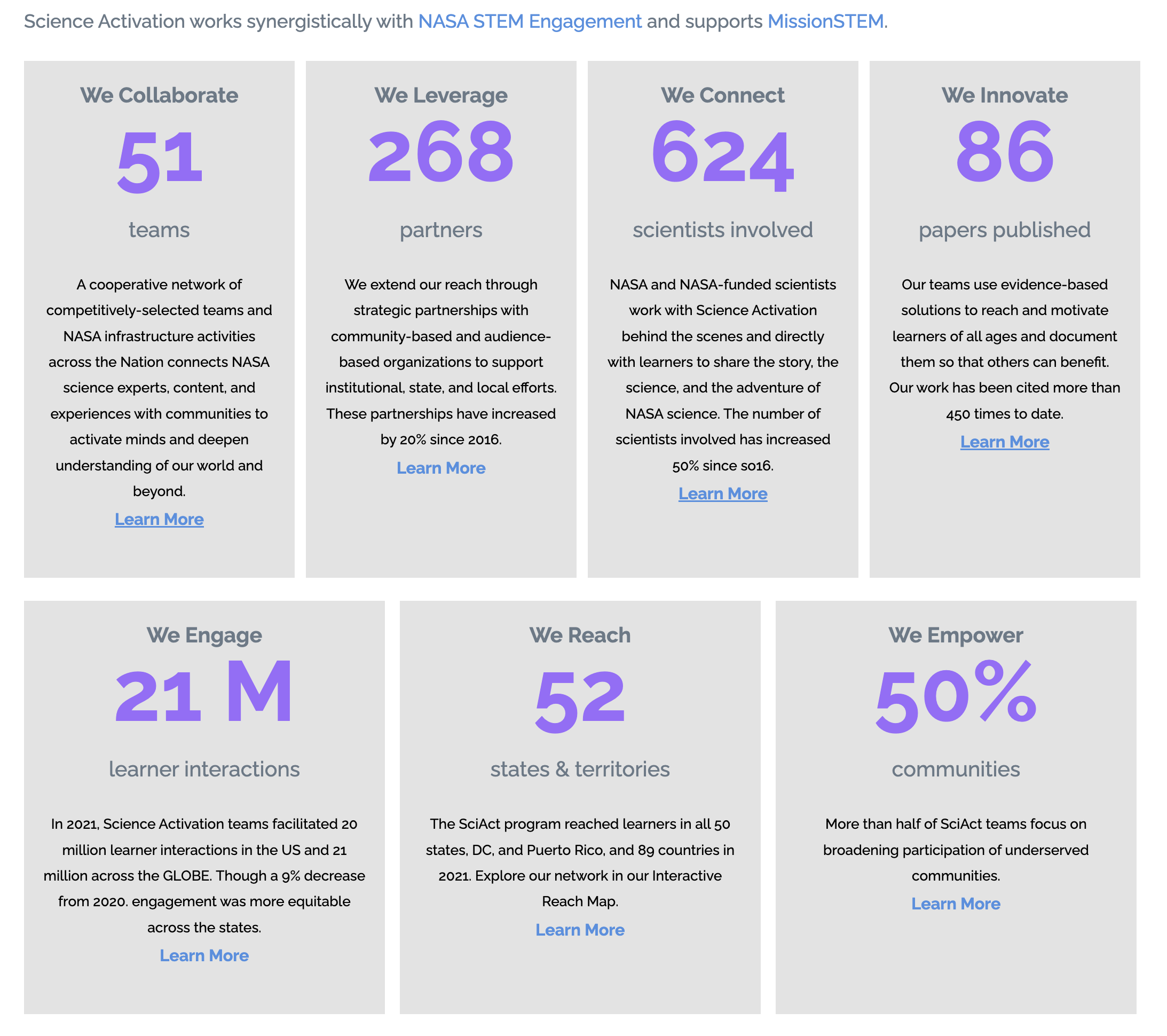Connect Your Research to Activities Designed to Enable Science Learning
Emma Marcucci Space Telescope Science Institute
Denise Smith STScI
Kristen Erickson NASA Science
Hashima Hasan NASA Headquarters
and Lin Chambers (NASA Headquarters).
What Is the Science Activation Program?
NASA’s Science Mission Directorate (SMD) has a new approach to help learners of all ages “do” science, the Science Activation (SciAct) program! SciAct aims to incorporate NASA science experts and content into the learning environment with greater efficiency and effectiveness. To do so, the program funds competitively selected teams to connect NASA science experts, real content, and experiences with the general public in ways that activate minds and promote deeper understanding of our world and beyond. The resulting network of science and community-based institutions is highly collaborative and leverages over 250 partnerships. The teams that make up the SciAct ecosystem reach people of all ages, from children to adults, and span a range of delivery mechanisms and expertise working with different audiences. Through this collaborative model, NASA is able to leverage expertise in audiences, educational best practices, and NASA science to reach audiences nationwide in an impactful and efficient way.
SciAct began its second phase of work, or Science Activation 2.0, in 2021. The involvement of subject-matter experts (SMEs) is a key factor in the success of the work, and we hope that American Astronomical Society meeting attendees will join us to learn more about ways to become involved.

What Is NASA Citizen Science?
NASA SMD’s Citizen Science initiative engages learners in the process of doing science. Citizen science is defined as a form of open collaboration in which individuals or organizations participate voluntarily in the scientific process in various ways. SMD selects citizen science projects through open competition as a part of its research program. Multiple SciAct projects also have citizen science components that integrate scientific content, best practices in learning, audience expertise, and the process of science to engage learners in doing science themselves. SMEs lead these citizen science activities and work with multi-disciplinary teams to effectively mobilize large numbers of volunteers to advance science knowledge. Additional SMEs are welcome to join the effort to engage more volunteers and make new discoveries.
Come Meet Us at the Summer 2022 Meeting of the AAS
 SMEs provide a human connection to science and ensure the scientific integrity of SciAct products and learning experiences. SciAct teams and citizen science projects involve SMEs in a focused way, based on their interests, available time, and areas of scientific expertise. SMEs have the opportunity to deliver presentations and interviews, provide and review science content, help organizations develop exhibits and science programming, participate in community events, and much more. Establishing effective collaborations with diverse SMEs, who serve as role models to audiences historically underrepresented in STEM fields, and early-career SMEs, who connect well with youth audiences, is an area of focus for involving SMEs in SMD’s SciAct and citizen science activities.
SMEs provide a human connection to science and ensure the scientific integrity of SciAct products and learning experiences. SciAct teams and citizen science projects involve SMEs in a focused way, based on their interests, available time, and areas of scientific expertise. SMEs have the opportunity to deliver presentations and interviews, provide and review science content, help organizations develop exhibits and science programming, participate in community events, and much more. Establishing effective collaborations with diverse SMEs, who serve as role models to audiences historically underrepresented in STEM fields, and early-career SMEs, who connect well with youth audiences, is an area of focus for involving SMEs in SMD’s SciAct and citizen science activities.
At this summer's AAS meeting — the first in-person AAS meeting since January 2020 — SciAct teams will be engaging with the astronomy community to share information about their programs and how to get involved. Join one of these sessions to learn how you can connect your science to more learners and activate more science learning and engagement.
-
“Enabling Learning in a Changed World: NASA's Science Activation Program” Special Session, Monday, June 13, 2022, 2:00–3:30 pm PDT. This special session will highlight ways that Science Activation teams are working to meet the needs of learners and science experts in this changed world, with a focus on astrophysics-themed efforts, as well as introduce participants to NASA Science Mission Directorate’s citizen science activities and nationwide Webb Community Events.
-
“Seed-Grant Opportunity with NASA SCoPE” Splinter Session, Tuesday, June 14, 2022, 2:00–3:30 pm PDT. This session will be focused on providing graduate students, early career scientists, and established scientists the opportunity to apply for a competitively selected seed grant to support their collaboration with one or more NASA Science Activation (SciAct) teams. Come learn about the goals of SciAct, meet and interact with various members from SciAct teams, and discover how subject-matter experts can co-develop a product or activity.

